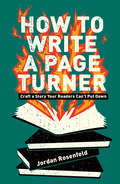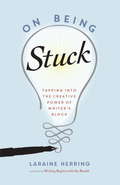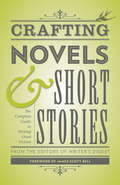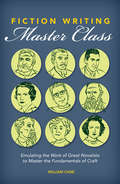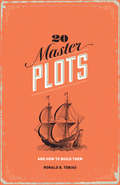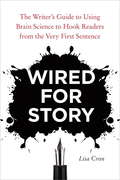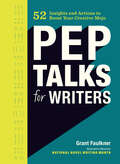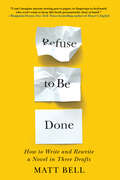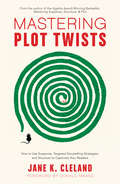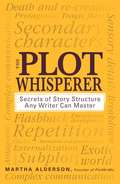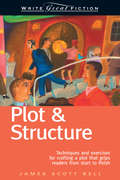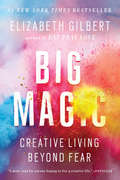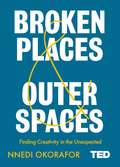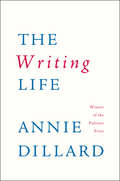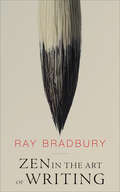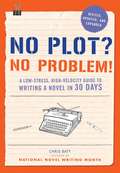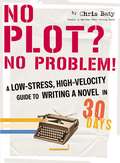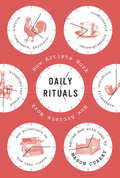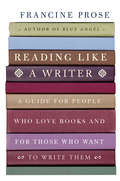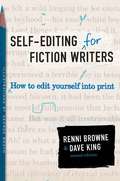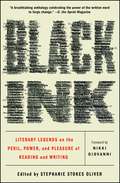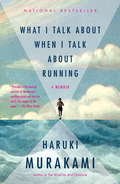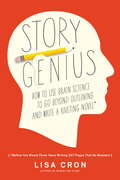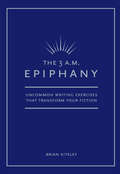Special Collections
NaNoWriMo
Description: Are you participating in National Novel Writing Month (NaNoWriMo)? If so, get started with some craft books on writing and revising! #writing #writer #nanowrimo #nationalnovelwritingmonth
- Table View
- List View
How To Write A Page-Turner
by Jordan RosenfeldInfuse Your Fiction with the Powerful Tug of Tension! Tension is the heart of conflict, the backbone of uncertainty, the hallmark of danger. It keeps readers guessing and characters on their toes. When you've got tension in place, stories leave readers breathless and wanting more. When it's missing, scenes feel inconsequential, plots drag, and characters meander. Learning the craft of writing can sometimes feel like a paint by numbers approach--connect compelling character A to plot event B. To avoid writing that's formulaic, predictable, and slow, How to Write a Page Turner will help you sew the threads of tension tight for an unforgettable story. You'll learn how to:Recognize the essential tension elements of danger, conflict, uncertainty, and withholding, and add them to your fictionCreate levels of tension in your characters through flaws, dialogue, power struggles, and moreBuild tension at energetic markers throughout the plotUse intimate imagery, strong sentences, and well-chosen words to build tension in expositionWhile this book walks you through the key areas that need tension building, from character to plot, it also delves deeper, analyzing exceptional examples from contemporary fiction's most gripping page-turners. So as you dive into the inner conflicts of a character's deepest psyche, to the mechanics of how you reveal information to the reader, you'll also discover how to craft a story your readers can't put down!
On Being Stuck
by Laraine Herring"Writer's block is not a mysterious force that has aligned with your writing to stop you in your tracks. Writer's block occurs when hope meets fear--when our expectations for a project or ourselves as writers run head first into the fear(s) that are uniquely tied to that hope. Writer's block is not external. It is not part of a vast conspiracy. It is a signal from deep within to pay attention to the writing and to pay attention to what the writing is asking of us as writers. Using deep inquiry, writing, body and breath exercises, and a range of interdisciplinary approaches, On Being Stuck helps writers uncover the gifts hidden within their creative blocks and deepen their relationship not only to their work but to themselves. "
Crafting Novels & Short Stories
by Editors of Writer's DigestLearn How to Create Stories That Captivate Agents, Editors, and Readers Alike! Inside you'll find the tools you need to build strong characters, keep your plots moving, master the art of dialogue, choose the right point of view, and more. This comprehensive book on the art of novel and short story writing is packed with advice and instruction from best-selling authors and writing experts like Nancy Kress, Elizabeth Sims, Hallie Ephron, N.M. Kelby, Heather Sellers, and Donald Maass, plus a foreword by James Scott Bell. You'll learn invaluable skills for mastering every area of the craft: Define and refine your characters. Make your plot and conflict high-energy and intense. Hone your story's point of view. Create a rich setting and backstory. Craft dialogue that rings true. Select the right words and descriptions throughout your story. Revise your story to perfection. Throughout you'll find supplemental sections that cover special topics like getting started, beating writer's block, researching your work, and getting published. They'll help you integrate your skills into a balanced, productive, and fulfilling career. Whether you're writing flash fiction, a short story, a novel, or an epic trilogy, you'll come away with the tools you need for strong and effective storytelling.
Fiction Writing Master Class
by William CaneWant to find your voice? Learn from the best! In your development as a writer, you've likely been told to develop your own unique writing style, as if it were as simple as pulling it out of thin air. But finding your voice isn't easy--it requires time, practice, and a thorough understanding of how great fiction is written. Fiction Writing Master Class analyzes the writing styles of twenty-one superior novelists including Charles Dickens, Edith Wharton, Franz Kafka, Flannery O'Connor, Ray Bradbury, and many others. This fascinating and insightful guide mines the writing secrets of these exceptional authors and shows you how to use them to develop a writing style that stands out in a crowd. You'll discover how to: Create characters as memorable as Herman Melville's Captain Ahab Master point of view with techniques from Fyodor Dostoevsky Pick up the pace by keeping your sentences lean like Ernest Hemingway Incorporate sensual details like James Bond creator Ian Fleming Add suspense to your story by following the lead of horror master Stephen King And that's not all, Fiction Writing Master Class is your key to understanding and implementing the proven techniques of history's greatest authors, taking your writing to a whole new level of excellence in the process.
20 Master Plots
by Ronald B TobiasGive your story a solid foundation-a plot that engages readers from start to finish! The best stories linger in the hearts and minds of readers for decades. These tales gain their power through plots that connect with the audience on both an emotional and intellectual level. Inside Ronald B. Tobias details these 20 time-tested plots. Each is discussed and analyzed, illustrating how a successful plot integrates all the elements of a story. Tobias then shows you how to use these plots effectively in your own work. Tobias then goes to the next level, showing you how to choose and develop plot in fiction. He shows you how to craft plot for any subject matter, so that you develop your work evenly and effectively. As a result, your fiction will be more cohesive and convincing, making your story unforgettable for readers everywhere. "Plot isn't an accessory that conveniently organizes your material according to some ritualistic magic. You don't just plug in plot like a household appliance and expect it to do its job. Plot is organic. It takes hold of the writer and the work from the beginning." -Ronald Tobias
Wired for Story
by Lisa CronThis guide reveals how writers can utilize cognitive storytelling strategies to craft stories that ignite readers' brains and captivate them through each plot element. Imagine knowing what the brain craves from every tale it encounters, what fuels the success of any great story, and what keeps readers transfixed. Wired for Story reveals these cognitive secrets--and it's a game-changer for anyone who has ever set pen to paper. The vast majority of writing advice focuses on "writing well" as if it were the same as telling a great story. This is exactly where many aspiring writers fail--they strive for beautiful metaphors, authentic dialogue, and interesting characters, losing sight of the one thing that every engaging story must do: ignite the brain's hardwired desire to learn what happens next. When writers tap into the evolutionary purpose of story and electrify our curiosity, it triggers a delicious dopamine rush that tells us to pay attention. Without it, even the most perfect prose won't hold anyone's interest. Backed by recent breakthroughs in neuroscience as well as examples from novels, screenplays, and short stories, Wired for Story offers a revolutionary look at story as the brain experiences it. Each chapter zeroes in on an aspect of the brain, its corresponding revelation about story, and the way to apply it to your storytelling right now.
Pep Talks for Writers
by Grant FaulknerEvery writer knows that as rewarding as the creative process is, it can often be a bumpy road. Have hope and keep at it! Designed to kick-start creativity, this handbook from the executive director of National Novel Writing Month gathers a wide range of insights and advice for writers at any stage of their career. From tips about how to finally start that story to helpful ideas about what to do when the words just aren't quite coming out right, Pep Talks for Writers provides motivation, encouragement, and helpful exercises for writers of all stripes.
Refuse to Be Done: How to Write and Rewrite a Novel in Three Drafts
by Matt BellThey say writing is rewriting. So why does the second part get such short shrift? Refuse To Be Done will guide you through every step of the novel writing process, from getting started on those first pages to the last tips for making your final draft even tighter and stronger. From lauded writer and teacher Matt Bell, Refuse to Be Done is encouraging and intensely practical, focusing always on specific rewriting tasks, techniques, and activities for every stage of the process. You won&’t find bromides here about the &“the writing Muse.&” Instead, Bell breaks down the writing process in three sections. In the first, Bell shares a bounty of tactics, all meant to push you through the initial conception and get words on the page. The second focuses on reworking the narrative through outlining, modeling, and rewriting. The third and final section offers a layered approach to polishing through a checklist of operations, breaking the daunting project of final revisions into many small, achievable tasks. Whether you are a first time novelist or a veteran writer, you will find an abundance of strategies here to help motivate you and shake up your revision process, allowing you to approach your work, day after day and month after month, with fresh eyes and sharp new tools.
Mastering Plot Twists
by Donald Maass and Jane Cleland"...A unique and absolutely invaluable toolbox for any author..." ~Kate White, New York Times best-selling author and former editor-in-chief of CosmopolitanUnlock the secrets to superior plot twists! The key to keeping people on the edge of their seat--from memoirs to thrillers and stage plays to screenplays--is filling your stories with unexpected twists and turns. By integrating Plot Twists, Plot Reversals, and Moments of Heightened Danger (TRDs) at crucial points, you can captivate your readers with I-can't-wait-to-see-what-happens-next intrigue. The quicker pace and focused action that comes from strategically placed twists form the core of the nuanced, multifaceted books that sell--and that help you find a devoted readership. In Mastering Plot Twists, Agatha Award-winning author, Jane K. Cleland goes beyond telling writers what to do; she shows you how to do it. Within these pages, you'll find:A proven, five-step process for using TRDs, with detailed examples from best-selling booksA deep dive into plotting, structure, pacing, subplots, and more to help you develop surprising yet inevitable twists."Jane's Plotting Roadmap" and worksheets--essential tools for planning your plotBuilding on the award-winning instruction provided in Mastering Suspense, Structure & Plot, Cleland's newest guide will help you create effective and credible twists, creating the kind of stories that will keep your readers up long into the night. "...A master class in crafting plots that twist and turn..." ~Hallie Ephron, New York Times best-selling author of You'll Never Know, Dear
The Plot Whisperer
by Martha AldersonWhen it comes to writing bestsellers, it's all about the plot. Trouble is, plot is where most writers fall down--but you don't have to be one of them. With this book, you'll learn how to create stories that build suspense, reveal character, and engage readers--one scene at a time.Celebrated writing teacher and author Martha Alderson has devised a plotting system that's as innovative as it is easy to implement. With her foolproof blueprint, you'll learn to devise a successful storyline for any genre. She shows how to:Use the power of the Universal Story Create plot lines and subplots that work togetherEffectively use a scene tracker for maximum impactInsert energetic markers at the right points in your storyShow character transformation at the book's climaxThis is the ultimate guide for you to write page-turners that sell!
Write Great Fiction
by James Scott BellTechniques and exercises for crafting a plot that grips readers from start to finish.
Big Magic
by Elizabeth Gilbert"A must read for anyone hoping to live a creative life... I dare you not to be inspired to be brave, to be free, and to be curious." --PopSugarFrom the worldwide bestselling author of Eat Pray Love: the path to the vibrant, fulfilling life you've dreamed of. Readers of all ages and walks of life have drawn inspiration and empowerment from Elizabeth Gilbert's books for years. Now this beloved author digs deep into her own generative process to share her wisdom and unique perspective about creativity. With profound empathy and radiant generosity, she offers potent insights into the mysterious nature of inspiration. She asks us to embrace our curiosity and let go of needless suffering. She shows us how to tackle what we most love, and how to face down what we most fear. She discusses the attitudes, approaches, and habits we need in order to live our most creative lives. Balancing between soulful spirituality and cheerful pragmatism, Gilbert encourages us to uncover the "strange jewels" that are hidden within each of us. Whether we are looking to write a book, make art, find new ways to address challenges in our work, embark on a dream long deferred, or simply infuse our everyday lives with more mindfulness and passion, Big Magic cracks open a world of wonder and joy.From the Hardcover edition.
Broken Places & Outer Spaces
by Nnedi OkoraforNnedi Okorafor was never supposed to be paralyzed. A college track star and budding entomologist, Nnedi’s lifelong battle with scoliosis was just a bump in her plan - something a simple surgery would easily correct. But when Nnedi wakes from the surgery to find she can’t move her legs, her entire sense of who she is begins to waver. Confined to a hospital bed for months, unusual things begin to happen. Psychedelic bugs crawl her hospital walls; strange dreams visit her nightly. She begins to feel as if she’s turning into a cyborg. Unsure if she’ll ever walk again, Nnedi begins to put these experiences into writing, conjuring up strange, fantastical stories. What Nnedi discovers during her confinement would prove to be the key to her life as a successful science fiction writer: In science fiction, when something breaks, something greater often emerges from the cracks. While she may be bedridden, instead of stopping her journey Nnedi’s paralysis opens up new windows in her mind, kindles her creativity and ultimately leads her to become more alive than she ever could have imagined. Nnedi takes the reader on a journey from her hospital bed deep into her memories, from her painful first experiences with racism as a child in Chicago to her powerful visits to her parents’ hometown in Nigeria, where she got her first inkling that science fiction has roots beyond the West. This was not the Africa that Nnedi knew from Western literature - an Africa that she always read was a place left behind. The role of technology in Nigeria opened her eyes to future-looking Africa: cable TV and cell phones in the village, 419 scammers occupying the cybercafés, the small generator connected to her cousin’s desktop computer, everyone quickly adapting to portable tech devices due to unreliable power sources. Nnedi could see that Africa was far from broken, as she’d been taught, and her experience there planted the early seeds of sci-fi - a genre that speculates about technologies, societies, and social issues - from an entirely new lens. In Broken Places & Outer Spaces, Nnedi uses her own experience as a jumping off point to follow the phenomenon of creativity born from hardship. From Frida Kahlo to Mary Shelly, she examines great artists and writers who have pushed through their limitations, using hardship to fuel their work. Through these compelling stories and her own, Nnedi reveals a universal truth: What we perceive as limitations have the potential to become our greatest strengths - far greater than when we were unbroken.
The Writing Life
by Annie DillardAnnie Dillard has written eleven books, including the memoir of her parents, An American Childhood; the Northwest pioneer epic The Living; and the nonfiction narrative Pilgrim at Tinker Creek. A gregarious recluse, she is a member of the American Academy of Arts and Letters.
Zen in the Art of Writing
by Ray BradburyThe celebrated author of Fahrenheit 451 and The Martian Chronicles offers inspiration and insight on finding one&’s muse and channeling it onto the page. Acclaimed writer of novels and short stories as well as screen- and stage plays, Ray Bradbury has established himself as one of the most legendary voices in science fiction and fantasy. In Zen in the Art of Writing, he shares how his unbridled passion for creating worlds made him a master of the craft. Part memoir, part philosophical guide, the essays in this book teach the joy of writing. Rather than focusing on the mechanics of putting words together, Bradbury&’s zen is found in the celebration of storytelling that drove him to write every day. Bringing together eleven essays and a series of poems written with his own unique style and fervor, Zen in the Art of Writing is a must read for all prospective writers and Bradbury fans. &“Bradbury lovers will find this a Bradbury feast.&” —Kirkus Reviews
No Plot? No Problem! Revised and Expanded Edition
by Chris BatyChris Baty, founder of the wildly successful literary marathon known as National Novel Writing Month, has completely revised and expanded his definitive handbook for extreme noveling. Chris pulls from over 15 years of results-oriented writing experience to pack this compendium with new tips and tricks, ranging from week-by-week quick reference guides to encouraging advice from authors, and much more. His motivating mix of fearless optimism and practical solutions to common excuses gives both first-time novelists and results-oriented writers the kick-start they need to embark on an exhilarating creative adventure.
No Plot? No Problem!
by Chris BatyChris Baty, motivator extraordinaire and instigator of a wildly successful writing revolution, spells out the secrets of writingand finishinga novel. Every fall, thousands of people sign up for National Novel Writing Month (NaNoWriMo), which Baty founded, determined to (a) write that novel or (b) finish that novel in--kid you not--30 days. Now Baty puts pen to paper himself to share the secrets of success. With week-specific overviews, pep "talks," and essential survival tips for today's word warriors, this results-oriented, quick-fix strategy is perfect for people who want to nurture their inner artist and then hit print! Anecdotes and success stories from NaNoWriMo winners will inspire writers from the heralding you-can-do-it trumpet blasts of day one to the champagne toasts of day thirty. Whether it's a resource for those taking part in the official NaNo WriMo event, or a stand-alone handbook for writing to come, No Plot? No Problem! is the ultimate guide for would-be writers (or those with writer's block) to cultivate their creative selves.
Overcoming Resistance
by Jerald M. JellisonA clear, concise, and useable guide to making change happen. - Martha Gates, Vice President, Pacific Mutual Life Insurance
Daily Rituals
by Mason CurreyFranz Kafka, frustrated with his living quarters and day job, wrote in a letter to Felice Bauer in 1912, "time is short, my strength is limited, the office is a horror, the apartment is noisy, and if a pleasant, straightforward life is not possible then one must try to wriggle through by subtle maneuvers." Kafka is one of 161 inspired--and inspiring--minds, among them, novelists, poets, playwrights, painters, philosophers, scientists, and mathematicians, who describe how they subtly maneuver the many (self-inflicted) obstacles and (self-imposed) daily rituals to get done the work they love to do, whether by waking early or staying up late; whether by self-medicating with doughnuts or bathing, drinking vast quantities of coffee, or taking long daily walks. Thomas Wolfe wrote standing up in the kitchen, the top of the refrigerator as his desk, dreamily fondling his "male configurations". . . Jean-Paul Sartre chewed on Corydrane tablets (a mix of amphetamine and aspirin), ingesting ten times the recommended dose each day . . . Descartes liked to linger in bed, his mind wandering in sleep through woods, gardens, and enchanted palaces where he experienced "every pleasure imaginable." Here are: Anthony Trollope, who demanded of himself that each morning he write three thousand words (250 words every fifteen minutes for three hours) before going off to his job at the postal service, which he kept for thirty-three years during the writing of more than two dozen books . . . Karl Marx . . . Woody Allen . . . Agatha Christie . . . George Balanchine, who did most of his work while ironing . . . Leo Tolstoy . . . Charles Dickens . . . Pablo Picasso . . . George Gershwin, who, said his brother Ira, worked for twelve hours a day from late morning to midnight, composing at the piano in pajamas, bathrobe, and slippers . . . Here also are the daily rituals of Charles Darwin, Andy Warhol, John Updike, Twyla Tharp, Benjamin Franklin, William Faulkner, Jane Austen, Anne Rice, and Igor Stravinsky (he was never able to compose unless he was sure no one could hear him and, when blocked, stood on his head to "clear the brain"). Brilliantly compiled and edited, and filled with detail and anecdote, Daily Rituals is irresistible, addictive, magically inspiring.
Reading Like a Writer
by Francine ProseLong before there were creative-writing workshops and degrees, how did aspiring writers learn to write? By reading the work of their predecessors and contemporaries, says Francine Prose. In Reading Like a Writer, Prose invites you to sit by her side and take a guided tour of the tools and the tricks of the masters. She reads the work of the very best writers—Dostoyevsky, Flaubert, Kafka, Austen, Dickens, Woolf, Chekhov—and discovers why their work has endured. She takes pleasure in the long and magnificent sentences of Philip Roth and the breathtaking paragraphs of Isaac Babel; she is deeply moved by the brilliant characterization in George Eliot's Middlemarch. She looks to John Le Carré for a lesson in how to advance plot through dialogue, to Flannery O'Connor for the cunning use of the telling detail, and to James Joyce and Katherine Mansfield for clever examples of how to employ gesture to create character. She cautions readers to slow down and pay attention to words, the raw material out of which literature is crafted. Written with passion, humor, and wisdom, Reading Like a Writer will inspire readers to return to literature with a fresh eye and an eager heart.
Self-Editing for Fiction Writers, Second Edition
by Dave King and Renni BrowneHundreds of books have been written on the art of writing. Here at last is a book by two professional editors to teach writers the techniques of the editing trade that turn promising manuscripts into published novels and short stories. In this completely revised and updated second edition, Renni Browne and Dave King teach you, the writer, how to apply the editing techniques they have developed to your own work. Chapters on dialogue, exposition, point of view, interior monologue, and other techniques take you through the same processes an expert editor would go through to perfect your manuscript. Each point is illustrated with examples, many drawn from the hundreds of books Browne and King have edited.
Black Ink
by Stephanie Stokes OliverOver 250 years of black American literature in a “breathtaking anthology celebrating the power of the written word to forge change” (O, The Oprah Magazine).Throughout American history, black people are the only group to have been forbidden by law to learn to read. This expansive collection seeks to shed light on that injustice, putting some of America’s most cherished voices in a conversation in one magnificent volume that presents reading as an act of resistance.Organized into three sections—the Peril, the Power, and the Pleasure—and featuring a vast array of contributors both classic and contemporary, Black Ink presents the brilliant diversity of black thought in America while solidifying the importance of these writers within the greater context of the American literary tradition. “This electric and electrifying collection of voices serves to open a much-needed window onto the freedom struggle of black literature. It’s a marvel, and a genuine gift for readers everywhere.” —Wil Haygood, author of The Butler: A Witness to History“A well-chosen selection . . . Revelatory, often moving essays by impressive writers.” —Kirkus ReviewsContributors include: Frederick Douglass * Solomon Northup * Booker T. Washington * W.E.B. Du Bois * Zora Neale Hurston * Langston Hughes * James Baldwin * Malcolm X * Maya Angelou * Martin Luther King, Jr. * Toni Morrison * Walter Dean Myers * Stokely Carmichael (Kwame Ture) * Alice Walker * Jamaica Kincaid * Henry Louis Gates, Jr. * Terry McMillan * Junot Diaz * Edwidge Danticat * Marlon James * Roxane Gay * Ta-Nehisi Coates * Chimamanda Ngozi Adichie * Colson WhiteheadIncludes a bonus in-depth interview with President Barack Obama
What I Talk About When I Talk About Running
by Haruki MurakamiAn intimate look at writing, running, and the incredible way they intersect, from the incomparable, bestselling author Haruki Murakami.While simply training for New York City Marathon would be enough for most people, Haruki Murakami's decided to write about it as well. The result is a beautiful memoir about his intertwined obsessions with running and writing, full of vivid memories and insights, including the eureka moment when he decided to become a writer. By turns funny and sobering, playful and philosophical, What I Talk About When I Talk About Running is rich and revelatory, both for fans of this masterful yet guardedly private writer and for the exploding population of athletes who find similar satisfaction in athletic pursuit.From the Trade Paperback edition.playful and philosophical, What I Talk About When I Talk About Running is rich and revelatory, both for fans of this masterful yet guardedly private writer and for the exploding population of athletes who find similar satisfaction in running.From the Hardcover edition.
Story Genius
by Lisa CronFollowing on the heels of Lisa Cron's breakout first book, Wired for Story, this writing guide reveals how to use cognitive storytelling strategies to build a scene-by-scene blueprint for a riveting story. It's every novelist's greatest fear: pouring their blood, sweat, and tears into writing hundreds of pages only to realize that their story has no sense of urgency, no internal logic, and so is a page one rewrite. The prevailing wisdom in the writing community is that there are just two ways around this problem: pantsing (winging it) and plotting (focusing on the external plot). Story coach Lisa Cron has spent her career discovering why these these methods don't work and coming up with a powerful alternative, based on the science behind what our brains are wired to crave in every story we read (and it's not what you think). In Story Genuis Cron takes you, step-by-step, through the creation of a novel from the first glimmer of an idea, to a complete multilayered blueprint--including fully realized scenes--that evolves into a first draft with the authority, richness, and command of a riveting sixth or seventh draft.From the Trade Paperback edition.
The 3 A.M. Epiphany
by Brian KiteleyIt is a dark and stormy night. You have been staring at a blank screen for four hours. Nothing is passing from your head to your fingers, frozen in place on the keyboard. Suddenly that sixth cup of coffee kicks in and you are inspired to take up Kiteley's (creative writing, U. of Denver) book. There you find "God," which turns out to be the name of one of his 201 exercises. Along with the thought- provoking and inspirational exercises, which tend to rely on combining memoir with imagination, Kitely provides commentary about the act and art of writing and gives practical as well as creative ideas about getting that book done, critiquing your own and others' work and writing fresh fiction with less anxiety of the dark and stormy night variety. Annotation ©2005 Book News, Inc., Portland, OR (booknews.com)
